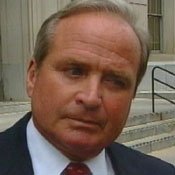Copy of Minor's Petition (PDF)
Former trial lawyer Paul Minor is appealing his judicial bribery conviction to the U.S. Supreme Court. In a petition filed Tuesday, Minor's attorney, former U.S. Solicitor General Ted Olson, argued that Minor's 2007 conviction for honest-services fraud is an unconstitutional infringement on free speech rights.
Minor was convicted in U.S. District Court of federal program bribery and honest services fraud—a crime created under the federal Racketeer Influenced and Corrupt Organizations (RICO) Act—after an earlier prosecution ended in a mistrial. Prosecutors alleged that Minor guaranteed 2008 campaign loans to former judges Winston Teel and John Whitfield and later paid off those loans to influence their rulings in future cases. Minor's case has drawn fire as an example of politically-motivated judicial prosecutions under the administration of President George W. Bush.
In the earlier trial, Minor's defense attorneys successfully inserted jury instructions that required jurors to find evidence that Minor sought specific official actions from the judges. In the 2007 re-trial, District Judge Henry Wingate—a Ronald Reagan appointee—denied Minor's proposed jury instructions. Wingate told jurors to convict if they saw evidence of "a corrupt agreement" for Minor to provide "things of value specifically with the intent to influence the action or judgment of the judge on any question, matter, cause or proceeding which may be then or thereafter pending subject to the judge's action or judgment."
Minor appealed his conviction to the 5th U.S. Circuit Court of Appeals, which in Dec. 2009 partially overturned his convictions on charges of federal program bribery. The appeals court upheld Minor's convictions on honest services fraud, however, and it is those convictions that Tuesday's petition challenges.
In the petition, Olson argued that the law is unclear on the requirements for a bribery conviction.
"Absent this Court's intervention, campaign donors will be vulnerable to politically motivated prosecutions based on innocuous, and constitutionally protected, campaign contributions mischaracterized by prosecutors as unlawful quid pro quo arrangements," Olson argued. "Such criminalization of basic political speech cannot be squared with the First Amendment."



Comments
Use the comment form below to begin a discussion about this content.
comments powered by Disqus